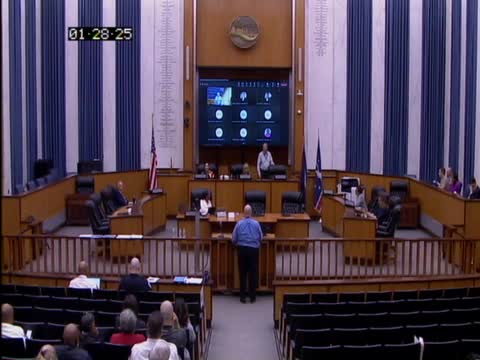City hires Hagerty for winter‑storm response assessment and recovery planning after water‑plant outage; council member faults communications
Get AI-powered insights, summaries, and transcripts
Subscribe
Summary
City emergency management and consultant Hagerty Consulting are developing a disaster recovery plan and an incident‑specific annex after a winter storm and water‑treatment plant outage; the committee heard a detailed timeline of response and sustained criticism from a committee member who said residents lacked timely notice and assistance.
Steven Willoughby, director of Emergency Communications, Preparedness and Response and the city’s emergency coordinator, told the Public Safety Standing Committee that the city activated an emergency operations center (EOC) after a January winter storm and a water‑treatment plant power outage on Jan. 6 that led to a boil‑water advisory and a citywide water distribution effort.
“On January 6, that's when the water treatment plant power plant had a power outage and begins to flood. At that point, we changed the posturing of the emergency operations center from a virtual environment to a full activation,” Willoughby said.
Willoughby said inclement‑weather sheltering began Jan. 3 and that the boil‑water advisory and water distribution started the evening of Jan. 6. He said the EOC shifted from full activation to monitoring Jan. 11, and city operations largely returned to normal around Jan. 13.
To guide recovery and capture reimbursable costs, Willoughby said the city engaged Hagerty Consulting to perform an incident response assessment, help staff the EOC during the response and prepare a post‑disaster recovery plan, an incident‑specific 2025 winter‑storm annex and a cost‑recovery plan.
Imar (Eimar) Marina Mazza, project manager and senior managing associate for Hagerty, described the three deliverables: a citywide disaster recovery plan (a general framework), an annex with tactical guidance specific to the winter storm and a cost‑recovery plan to identify potentially reimbursable expenses and document damage assessments.
Mazza said the team will review existing city documentation, run public and stakeholder surveys, and run working sessions with recovery support function groups — housing, infrastructure, community needs — to produce plans that city departments can use in future incidents. “The idea is that they become tactical tools that you all can pull out in the case of a disaster to recover from that event,” she said.
Council members pressed Willoughby about the timeline, notification systems and coordination. Committee Chairwoman Trammell voiced sharp dissatisfaction, saying residents in her district did not receive adequate or timely notice and that council members were not invited into early response briefings. “You let us down in the city of Richmond,” she said, recounting numerous constituent calls about delayed or missing messages and bottle or pallet distributions that reached some neighborhoods later than others. She described personally distributing water to seniors and coordinating with police officers to reach residents who could not travel to distribution sites.
Willoughby acknowledged the city’s previous alert system failed to reach many residents and said the replacement Richmond Ready alert system will go live Feb. 3. He said the city intends to use the new system for both emergency mass‑notifications and recurring, localized service alerts to test readiness. “We were having challenges with our old system. That's the system that's being replaced...the timing is just really horrible with that,” Willoughby said.
Willoughby and Hagerty said the incident‑assessment work will identify strengths and weaknesses in the city’s response and provide recommendations, including communications improvements and cost‑capture procedures for potential state or federal reimbursement.
Why it matters: A prolonged water outage and boil‑water advisory affected residents, hospitals and businesses across Richmond. The committee’s review and Hagerty’s work will shape how the city documents costs, coordinates cross‑department recovery and communicates with residents in future incidents.
Committee members asked that the consultant include communications improvements, stakeholder outreach and precise cost‑recovery steps in the deliverables.
